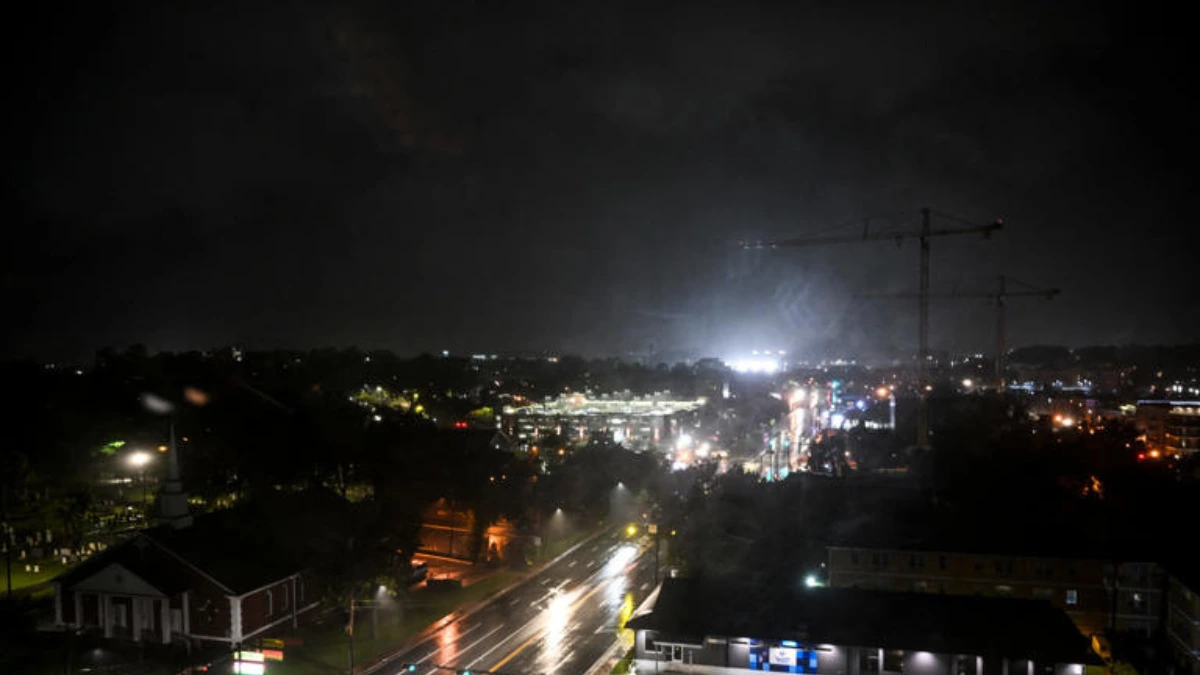Helene has weakened to a tropical storm as it moves through Georgia early Friday. It is causing life-threatening storm surge, winds, and flooding rain. This is hours after it made a devastating landfall in Florida’s Big Bend coast.
Helene made landfall at about 11:10 p.m. ET near Perry, Florida, with 140 mph winds. This made it the first known Category 4 storm to hit Florida’s Big Bend region in 1851.
For several hours, the storm maintained hurricane strength as it moved inland across northern Florida and into Georgia. By 5 a.m. ET, the National Hurricane Center said Helene was a tropical storm with sustained winds of 70 mph. It was located 40 miles east of Macon, Georgia, and 100 miles southeast of Atlanta, moving north at 30 mph.
The National Weather Service in Tallahassee said further weakening is expected as the storm moves inland.
At least one fatality in Florida was blamed on the hurricane so far, authorities said. In central Georgia, local news outlets reported that two people were dead after a mobile home overturned in a suspected tornado Thursday.
Officials feared more fatalities would be discovered on Friday, though it would likely be several hours before any rescue personnel could head out to help those in need.
All hurricane and tropical storm warnings have been discontinued along the Florida east coast south of the Flagler and Volusia county line, and along the Florida west coast south of the mouth of the Suwannee River, according to the National Hurricane Center.
Helene is tied as the fourteenth most powerful hurricane to hit anywhere in the U.S. in recorded history and the seventh most powerful to slam into Florida, according to National Hurricane Center data.
Rescues ongoing in Atlanta as Helene drenches Southeast
Authorities in the Atlanta metro area conducted rescues early Friday as Helene raced through the state, drenching a vast swath of the Southeast in multiple inches of rain.
About 25 people were rescued from a flooded apartment complex north of downtown Atlanta, reported WSBTV, citing the Atlanta Fire Rescue Department. Residents were sheltering in buses while flooding persisted, the outlet reported.
Nearby Peachtree Creek entered major flood stage, reaching a height of more than 23 feet. Flood watches and warnings were active across the state of Georgia, where all counties are under a state of emergency declared by Gov. Brian Kemp.
Helene causes flash flood emergency in North Carolina
In Mitchell and Avery counties in western North Carolina, officials declared a flash flood emergency warning residents of “catastrophic flooding.”
Officials reported major flooding throughout both counties as rainfall in excess of 7 to 10 inches closed roads, flooded bridges, inundated homes and businesses. Water rescues were ongoing throughout the region, according to the weather service.
“This is a PARTICULARLY DANGEROUS SITUATION. SEEK HIGHER GROUND NOW! Life threatening flash flooding of low water crossings, small creeks and streams, urban areas, highways, streets and underpasses,” said the weather service in nearby South Carolina.
National weather radar
Over 2 million without power across Florida, Georgia, the Carolinas amid Helene
Over 2.5 million homes and businesses across Florida, Georgia, South Carolina, and North Carolina were left without power early Friday. Helene brought powerful winds and heavy rain to the region.
Most outages were in Florida, with a focus on the Big Bend coast where the storm made landfall Thursday night. By 5:30 a.m., over 1.2 million utility customers were without power, according to a USA TODAY power outage tracker.
utages.
Florida boaters ride out Hurricane Helene
As Helene hit northwest Florida with over 100 mph winds and high water surges, Philip Tooke sent a brief but urgent message from his boat. He was not in his house but on his boat, trying to stay afloat.
“Lost power,” he wrote from St. Mark’s, 30 miles south of Tallahassee and 20 miles from where Helene hit the Aucilla River. Yet, he remained optimistic: “I’m floating.”
Tooke, a 63-year-old seafood market owner, and his brother stayed on their boats as Helene battered the area. They were among those who chose to stay on the water, despite evacuation orders and dire warnings. Their decision was made ahead of the Category 4 hurricane and warnings of death for those who stayed.
How much damage could Helene do?
It’s too early for detailed damage reports from the counties hit by Helene. The National Hurricane Center warns that Category 4 storms can cause severe damage to well-built homes, potentially losing roofs and walls. Trees are often snapped or uprooted, and power poles are downed.
“Power outages will last weeks to possibly months. Most of the area will be uninhabitable for weeks or months,” the hurricane center says of Category 4 storms.
The governors of Georgia and the Carolinas have declared states of emergencies as Helene moves through the Florida coast.
“We will likely avoid the brunt of this storm, but it is expected to bring flooding, high winds, and isolated tornadoes,” South Carolina Gov. Henry McMaster said. “Take proper precautions and monitor local forecasts.”
Head of FEMA to take first-hand look at Helene impacts
FEMA Administrator Deanne Criswell will visit Florida on Friday to assess the impacts of the storm and report back to Biden.
Criswell said she would fly as close as she could to Tallahassee and meet with Florida Gov. Ron DeSantis and his team. The FEMA leader said she would like to take an aerial tour if possible so she can see the damage for herself. Afterward, she is prepared to move up to Georgia, North Carolina and South Carolina, also expected to be heavily affected by Helene.
“Me being on the ground helps me validate some of the damage more quickly, so we can get major declarations in place faster,” she told reporters at a White House briefing Thursday, adding the agency has the resources it needs to respond to this disaster.
Criswell said FEMA has aggressively deployed resources in advance of Helene’s arrival and advised those likely to be impacted to do the same, both in Florida and across inland locations far from the storm’s landfall. Parts of Georgia, North Carolina, South Carolina and the Appalachians could get up to 20 inches of rain and experience widespread flooding.
“Take the storm seriously,” Criswell said. “People in Hurricane Helene’s path, you need to listen to your local officials. If they tell you to evacuate, please do so, and if they tell you to shelter in place, then that’s what you should do. They’re going to give you the best information that you can do for your specific situation. Those decisions can save lives.”

My name is Jakir, I am a content writer, content creator, I give business, sports, finance, trending news and I have 10 years of experience in this and this is my blog goldennews24.com.










